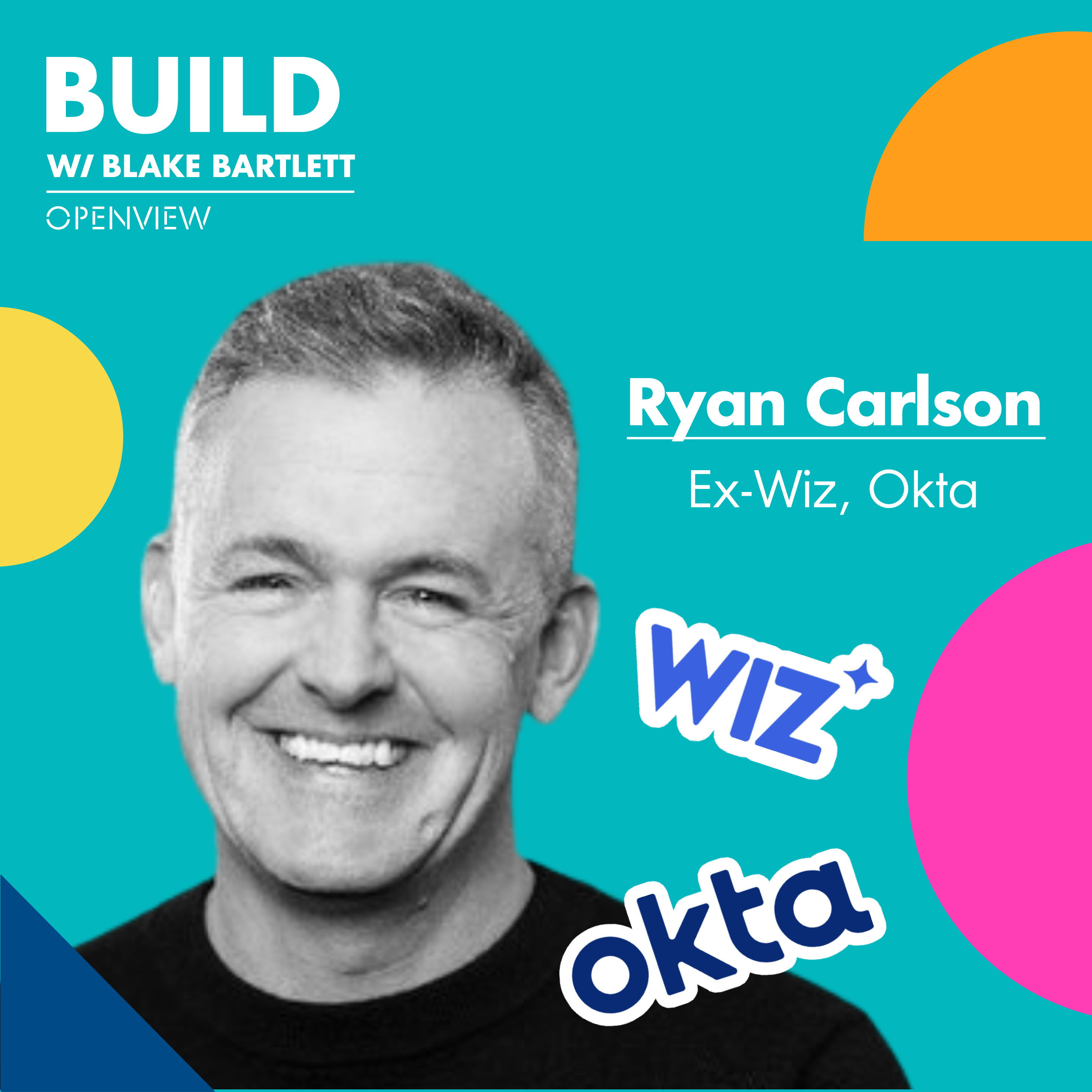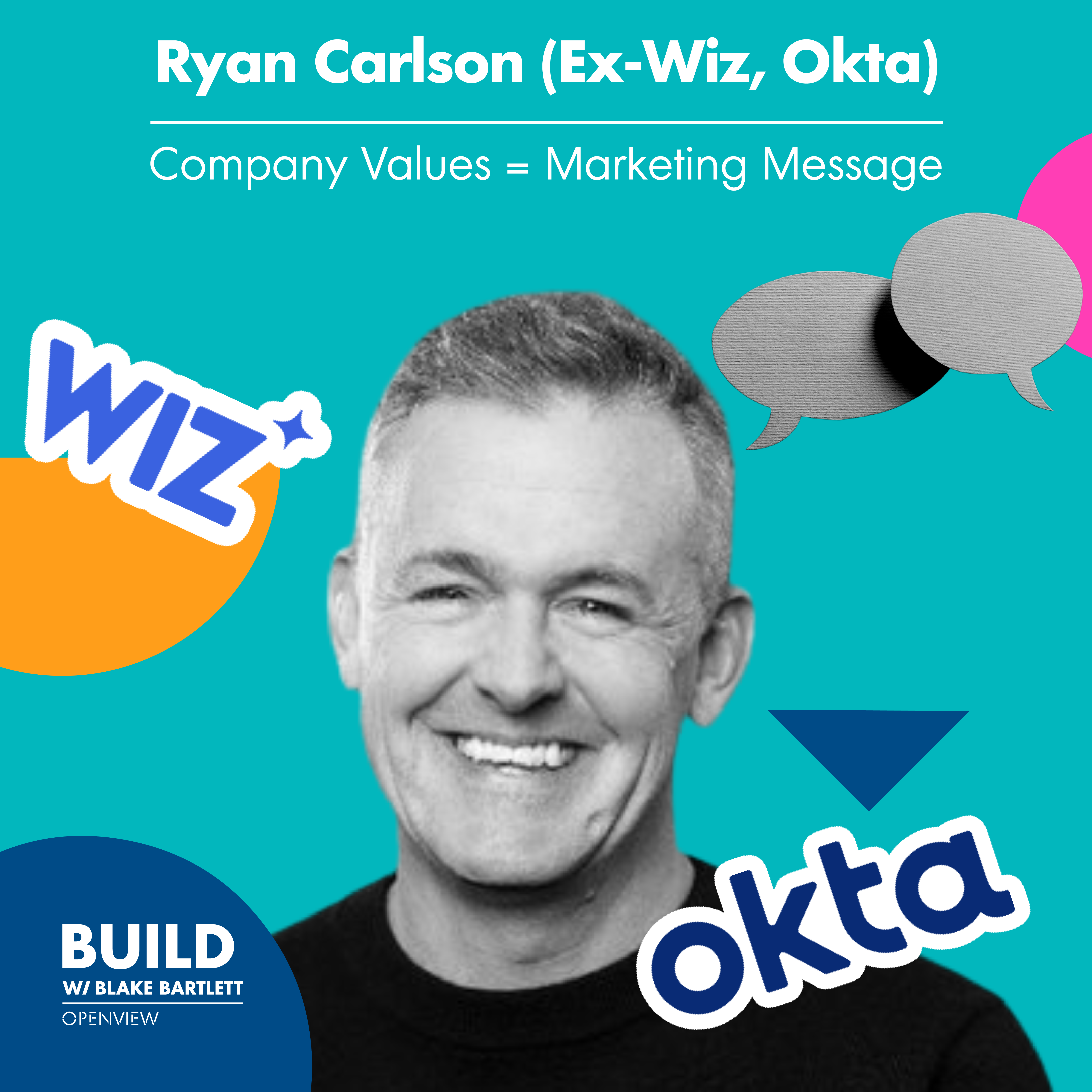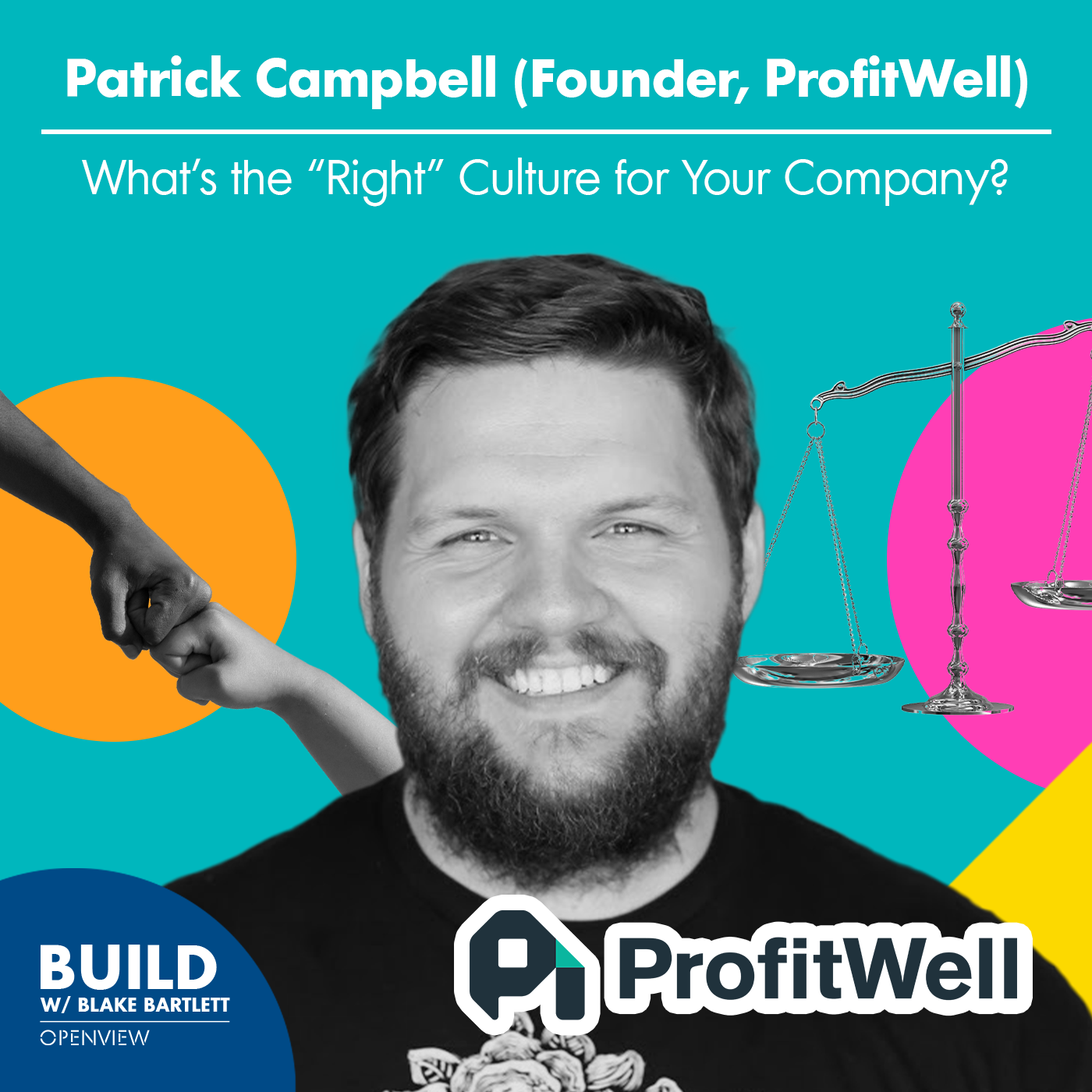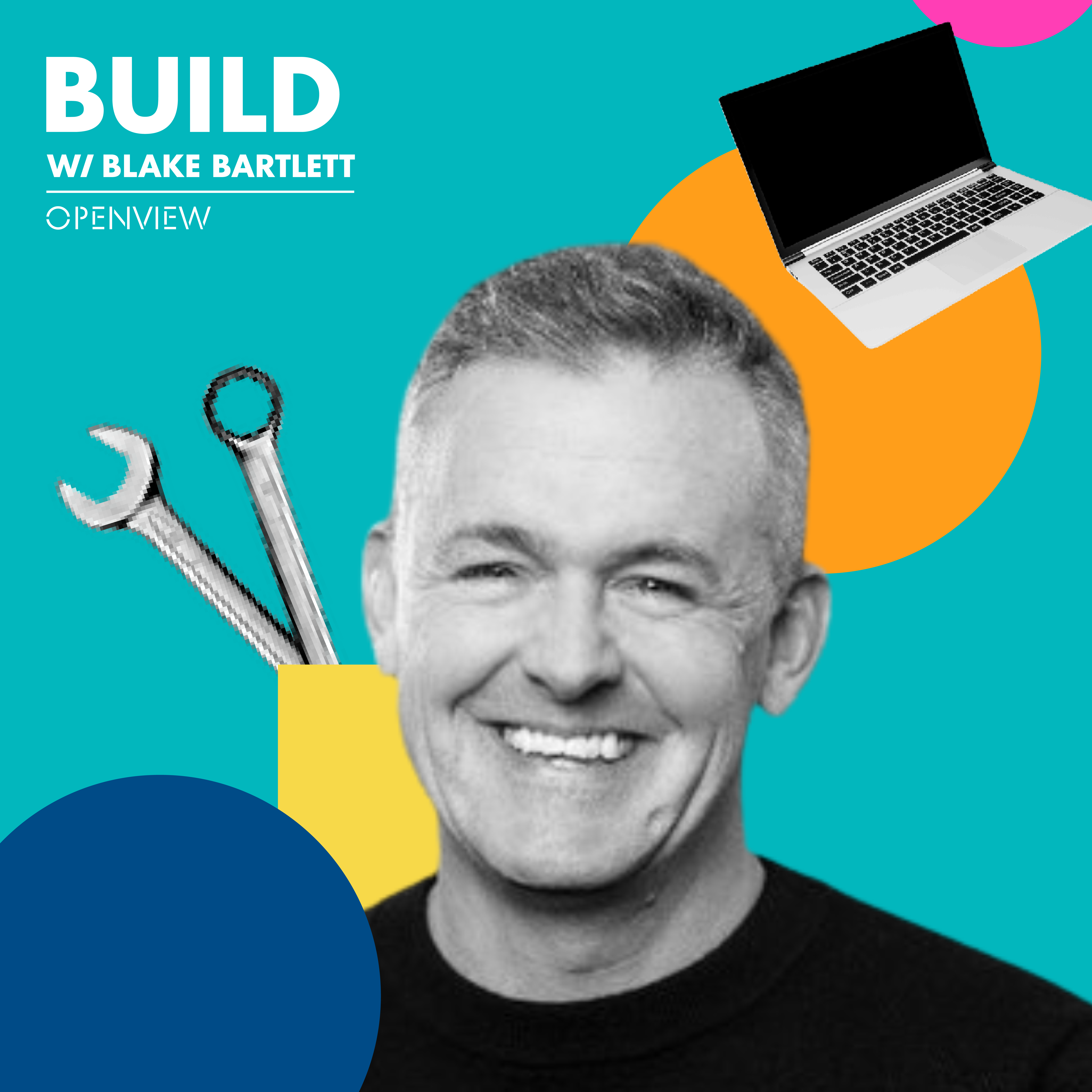Ryan Carlson (ex-Wiz, Okta): Company Values = Marketing Message
- 0.5
- 1
- 1.25
- 1.5
- 1.75
- 2
Blake Bartlett: Coming up on today's episode of Build.
Ryan Carlson: I think it's important to recognize that hyper growth company's culture is going to change, it's inevitable, but what is not going to change or what should it change, what's non- negotiable are your core values.
Blake Bartlett: Our guest today is Ryan Carlson, who's been in the CMO seat at amazing companies like Okta and Wiz. In fact, Ryan was at Okta for over 10 years. First as VP of product marketing, then as VP of marketing, and finally, five plus years as CMO. Ryan says that people often think about marketing in way too tactical of a manner. For example, viewing marketing as just a megaphone to tell the world about the great product your engineers built. Instead, Ryan says that marketing's role is to be the chief storyteller of a company. That story you're telling is the story of the company itself. Why does this company exist? What is your view of the world? How are you going to take us from the suboptimal present to the utopian future? How do I, the customer or the potential customer, fit into this story? This approach to marketing helps your audience connect with you on an emotional level, meaning they start believing your story and believing in you as a company. The rest, as they say, is just the details, the features, functions, and even the price become a secondary focus because they're on a mission with you. You can start to see how this flavor of strategic marketing connects in all kinds of ways to your company mission, values, and vision. Okay, so enough from me, and let's dive right in with Ryan Carlson. You and I were recently talking about Ben Horowitz's second book, which is called What You Do Is Who You Are, and the book is all about company culture. A lot of good stuff in there, but I wanted to get your sense of what were some of the biggest topics and concepts that jumped out to you in that book and how does that connect back to your world, which is marketing and marketing strategy?
Ryan Carlson: Well, first, I'm a huge fan of Ben Horowitz in general. His writing in particular. I owe actually my very lucky 10- year stint that I had at a company called Okta, I wouldn't have heard about Okta had I not been reading Ben's writing. I've learned a lot from it and I benefited from it. That book that you mentioned, What You Do Is Who You Are is around, not company culture necessarily, but company values. The book resonates with me for a couple of reasons. One, I've worked at a lot of different startups, most of which haven't worked, a couple that have. When you see a lot of different companies, you start to have a deeper appreciation later in your career maybe than you do early in your career for the importance of values. I think a lot of people skeptically look at company values as things that the HR team puts on the walls and it's pretty soft. I actually have now become very much convinced that a company's values are probably the most important thing when you look at, will this company be successful? Certainly, will this company be successful and be a company that I want to be a part of? The big takeaway for me from the book is just how articulate he is in describing the importance of company values and how they actually help the company operate more effectively. But also, just the different stories he tells and the different examples. You can talk about it, but if you lay out specific examples, that really drives the point home. A big takeaway for me is the importance of values in dictating whether a company's going to be successful. We can talk a lot, I'm sure, in this conversation about how that ties back to marketing.
Blake Bartlett: Definitely. Yeah. Well, there is so much there that fundamentally resonates with me. What should define the culture of an organization is the mission, the values, and the vision. But a lot of times, like you said, that's just something that's in the employee handbook and actually isn't talked about day to day. But that is the thing that should be guiding, how do we make decisions? How do we prioritize when things are tough and we need to make a hard decision? How are we going to make that hard decision? That's when you go to your values. Maybe as a first takeaway for folks, if your company does not talk about mission, values, vision, and it's something that just lives in the employee handbook, or you talk about it once a year when you're kicking off for the year coming up, you're doing it wrong. It needs to be a part of the culture, it needs to be in the water. It's something that you're living, breathing every single day.
Ryan Carlson: A hundred percent, yeah, and I think not to get specific about definitions, but values and culture are different. I think Ben certainly writes about this, but I think a lot of people have talked about a culture of a startup that's growing is going to change. It's inevitable that your culture evolves and changes and it's actually okay that it evolves and changes because you shouldn't be interviewing perspective employees for whether or not they fit with your culture. People talk about culture fit all the time. That's how you get environments that are inclusive and open to new and different ways of thinking about things and doing things. You should be looking for people who add to your culture, who both can benefit from how you do things, but also can bring their own viewpoint and experience and inputs and knowledge to bear on what you're trying to do. You look for people who add to your culture as your culture evolves. I think it's important to recognize that hyper growth company's culture is going to change. It's inevitable, but what is not going to change or what should it change, what's non- negotiable are your core values. What do we value? If we value integrity and transparency above all else, that's not going to change and it shouldn't change. Now, why is that important to make that distinction? One, is because I think people do mistake the two, what we value in our culture. They conflate the two and they're different, but you hit upon it in some of your comments. If the values that the company stands for and that they believe in are clear to everybody, you've not just ensured that people who come on board are going to value the same things that you do, and therefore are going to be consistent with what is important to you and your company. What you've done is you've enabled them to make decisions without your input. The values really come into play when somebody on the frontlines needs to make a decision and you do it now, and they either haven't been given explicit direction on what to do or they haven't experienced this situation before. They go back to their values. If they are consistent with what the company values, then you can be pretty certain that the decision they make and the actions that they take are going to be the ones that the company would've done. You've just ensured that your company can move faster now with less" error" because you're making decisions and you're taking actions based upon what's important to your company and those are your values. That is different from your culture. Your culture does evolve and change over time as more and different people come into your organization.
Blake Bartlett: Diving into the connection to marketing, what's the connection to marketing, marketing strategy, everything that's in your world to this company values topic?
Ryan Carlson: For many years at Okta, we had a first day new hire orientation. It was on the Monday of every week. The person, the new hire would come in and get their laptop, they'd get configured into the organization. Then, the first presentation that they received in orientation was from me, typically. The only time I didn't do this is if I was meeting with customers or if I was out of town. Other than that, I tried to give this presentation every single Monday and I presented two things. I presented the company overview, basically, the company pitch deck, what is Okta, what's our product, how do we view the market, how do we differentiate, all those things. But then I bolted onto the end of that a presentation about our values. Why would this chief marketing officer present the company pitch and the values on your first day? Well, in part because we wanted people to know that it was important, these things mattered and we wanted to know that the values that were important to the company, that should be important to every employee, fit into the marketing story. The brand that we were trying to build, the perception that we were trying to create amongst the people that mattered, our customers, our prospects, our investors, our employees, that was everybody's responsibility. It was every employee. Their first day, we wanted them to know the company's story and to know the values that we held close. They should know that because they learned that through the interview cycle. It's reinforced on their first day that, " Hey, if you're in finance, if you're in procurement, if you're in engineering, if you're in typically non- customer facing roles, you still had a responsibility to carry the company's story forward. To represent the company according to its values because that was going to inform how the world thought about us, how they remembered us, how they felt about us, which is all feeding into our brand.
Blake Bartlett: It's planting the seed from day one. It's because every employee, no matter what role you play, you still play two roles. Everybody plays the same roles, even if you have a different title, different department. That role is you're an ambassador. But then, back to one of the points you had said before, you're a delegate as well, you're a delegate in the sense that you are making decisions on behalf of everybody else that you work with, on behalf of this organization, and consistency is key there as well. You're planting the seed and making it very clear from day one that this is who we are and this is how you're going to play those two key roles of ambassador and delegate.
Ryan Carlson: Absolutely. Very important part of this also was everybody should walk out of their first day on the job more fired up than any other time. If we could fire up every single person, even in some small way on their first day, that was worth it. That was another benefit of telling everybody the story, connecting them back, connecting that story back to our values, and showing them in particular as individuals showing their role in all of that. That's really motivating as well.
Blake Bartlett: Yeah, so getting into more of the specifics of what this looks like in marketing. How does this approach to marketing get perceived by the prospect or the customer? What does the difference look like in real life to the audience if you're marketing this particular way?
Ryan Carlson: Well, I think anybody who's in marketing knows this and anybody who's not in marketing also knows and recognizes this, that great marketing is authentic. It's genuine to what the company really stands for, what they really believe. In technology products, there's this perception that you have to wade through the marketing BS to figure out what's really going on. Because a lot of the marketing is either too hyperbolic, it's trying to be compelling at the sake of credibility, or maybe a lot of marketing people don't necessarily understand the underlying technology that feeds into their technology based products. But I think it's fairly obvious to most people that great marketing should be authentic, but it's easier said than done. A big part of all of this that I've been talking about, about values, about what the company stands for, that feeds into a sense of everybody believing. There is this notion of, you want to hire people who are missionaries, not mercenaries. We can talk a lot about that. That's the profile of a good early stage startup employees. That they're there because they believe not just because they want to make a lot of money. But there's an intangible aspect of that, that you know it when you see it. When everybody believes in the story that they're telling, when they believe in the marketing that they're doing and it's genuinely and authentically connected back to a company that is doing what they say they're going to do and standing for what they say they stand for, it's just much more compelling marketing. It's impactful. It does not sacrifice credibility in pursuit of being compelling. It can be both and it's lasting, it's long lasting. It's a story that you tell with conviction because you believe it yourself. That is always going to be more impactful and more effective than a story that you tell just because it sounds good.
Blake Bartlett: Yeah, that wading through the marketing BS to find the truth, that should not be a requirement. If you're not being authentic and you're instead being salesy, you're just trying to use the buzz words, you're trying to be hyperbolic to get people's attention, the feeling inevitably from the person on the other side is going to be a bait and switch. Then, guess what? From day one, they don't trust you. You're trying to earn that trust back. Why not start on a footwear? This is who we are, this is consistent, this is true, and you can trust us and click here if you want to learn more, and you actually will learn more. As opposed to click here to find out what's actually true and what's BS.
Ryan Carlson: Yeah. The flip side to all of this, that what we've just been talking about can go the wrong way is when people strive so much toward credibility that they forget to be compelling. They'll say, " Oh, yeah, our product doesn't do that. It doesn't do that right now. That's on a roadmap." That's truthful, is that compelling? You know what? You can be both compelling and credible, and that trust you talk about, which is the outcome of being authentic and genuine can be strengthened and enhanced by bringing the customer in this example, about talking about some roadmap feature, into the fold of why is that thing, that feature not on your product today? Why is it on the roadmap? Or, maybe a better example, why is that a feature that you never plan to build? Why is that a feature that you believe that that customer shouldn't care about when they think they should? That you can actually make it more compelling without sacrificing credibility and build up that trust, which I think is the ultimate goal of many, many brands, for sure.
Blake Bartlett: All right, so before we get into the what and the specifics and how do you do this in the day to day, one more question to help us level set here, which is the who. Who do you hire to your marketing team? Who do you hire to marketing leadership in order to make sure that they're going to operate in this way versus not?
Ryan Carlson: It doesn't have to be true in every single person in a marketing organization, but you have to have a marketing organization that deeply understands the product and the technology, the competition, and the customers. That might sound obvious, like, who wouldn't want that? But it's way more common than you would think for a marketing team not to be in the details, and they should be. But I think more important than that, or a way to foster that and to amplify that is the ultimate arbiter of what matters is the customer. A marketing team and any marketing individual has to have the natural inclination and the desire and the ambition to go meet directly with customers. Either the people who are your current customers or the prospects that you want to be your customers. Steve Blank would say, " Get outside the four walls of your building." That's advice he would give to early stage startups in general. Founders should be out talking to customers, not sitting inside just building. You have to be able to do both. But I think you distill that to your marketing team. They have to be willing to go meet with customers. I'll talk to a product marketing person for example, and they have a new pitch deck, let's say, and a new feature. I'll say, " How's it going?" It was like, " It's not really resonating with customers, it's not really grabbing their attention." I'll say, " How do you know?" They say, " Well, all the sales people I talk to say it's not working." I say, " Well, what happened when you presented it to customers?" They said, " Oh, I haven't." I was like, " That's a failure." Talking to people who talk to your customers is not the same as talking to customers. No one group or organization inside a company has ownership of the voice of the customer. I think everybody should be talking to you and learning from and understanding customers. But I think marketing, everybody thinks of marketing as taking a message and spreading it and sending it out into the world. I think marketing should just as much be understanding the market, understanding customers, understanding competition, understanding what the future could look like, and bringing that distilled understanding back into the company to inform everybody as well. I think you have to be technical or have an organization that together is technical, and more importantly, you have to be willing and have an inclination to go talk to customers even if it's not your day job to go do so.
Blake Bartlett: On the other side of the coin, which is while you are hiring missionaries in this sense, people that are true believers, you also aren't hiring people that are dogmatic or that are ideological. So much believers that only their conception of the truth is the right one. Because that kind of persona can, and I've seen this before in marketers, I've seen this before in lots of different personas, but it can manifest as the customer's wrong.
Ryan Carlson: You do have to be willing to listen and be flexible and to tweak and adjust and modify your strongly held vision with the facts on the ground. I forget who said this, I quote a bunch of different people and I forget and I give them no attribution, so I'm doing that here. But I think somebody said, product market fit is not found. Product market fit is forged. That really resonates with me because it makes it seem like if you can iterate your way through AB testing to product market fit, then it's just this, a science experiment. That's not the way really groundbreaking products or companies are formed. They forge product market fit. Now, forging it means you don't just dogmatically, like you said, say this is how it's going to be and don't listen. But it is a very difficult battle and process and journey to find product market fit. I think that product market fit is forged. Sentiment really resonates with me because it does start with a very strong view of what the world should look like with your product or service in it. But of course, you have to get there by working in a partnership fashion with your customers, and that includes listening. But it does not mean just doing blindly what they say. Because I can give you countless examples just in the companies I've worked for, where customers told me things that they were adamant that they needed and they were wrong themselves because it's hard to get this stuff right. You have to be willing to have both a strong vision and be willing to modify it with feedback, but not just do what other people tell you without sticking to your vision, for sure.
Blake Bartlett: Just a quick break in today's conversation to make sure that you are getting all the latest in PLG content from OpenView. First things first, if you haven't subscribed to Build in your favorite podcast app, make sure you do that now. We drop four episodes per month and subscribing is the best way to stay in the loop. While you're at it, drop us a rating and review for the show so that others can find it as well. Secondly, did you know that I'm a YouTuber? I put out weekly videos on the latest and greatest in PLG with my show called the PLG 123. Every video is two minutes or less and features VC perspectives from yours truly on the latest in VC, SaaS, and of course, product led growth. Find me on YouTube by searching Blake Bartlett, and make sure to subscribe to my channel so that you don't miss a single video. Now, let's dive back into today's conversation. Getting into the tactics now and the practical of the in real life practice of this, what does that look like? If you are in the seat, you're a marketer that's looking to market in this way, behave in this way, work in this way, what actions do you take? How does it look different day to day?
Ryan Carlson: I think of all the different disciplines within marketing, product marketing is one of the hardest because it sees probably the most aspects of the business. It has a solid understanding of what you're building and why and the constraints around the technology. It should have a strong view and vision into what the customers need, because product marketing should be working directly with customers and with the sales team a lot. It has to understand the competition. It's the one part of marketing that sees a lot of that. A tactic there is, I think my first day on the job at Okta, back in the early days, there was a couple dozen people, handful of customers. I was building out the product marketing function. First day on the job, I got my laptop, got signed into things, and before I did any work I called all of the customers that we had as a company. I wanted to hear directly from them, why did you choose this product? What was it about the company that made you trust them? Early, it becomes clear when one company is going to win in a category or become a leader. But at that stage, all of those early customers were taking a real bet on a new company. Why were they doing that? I wanted to hear it from them. I could have talked to the sales people who won those deals. I could have talked to the product people who are building the product, who knew those customers well. But I wanted to talk to them directly. Tactically, bringing it back to what I mentioned before, talk to customers directly, both the ones that you have and the ones that you want to have. One of the things that I did, mostly because I'm hyper competitive, but also I'm hyper paranoid and I wanted to make sure we didn't miss anything. Anytime we lost a deal, we wanted a culture where bad news traveled faster than good news. Many companies have the practice when you win a deal, an email goes out and everybody... Well, now, it's on Slack, you get a Slack message and everybody adds their kudos and their emojis to it. Great job. I wanted to know about the losses way faster than the wins. Why did we lose this deal? Often, I would ask to talk to the customer without the sales team involved, not to change their mind, but just to learn. You'd be surprised what you would learn in a conversation like that. Sometimes it was silly things, like the customer said, " Hey, I really liked your product. I thought you guys had the best features. I just did not like your salesperson." That happens. People buy from people and that happens. They're never going to tell the salesperson that. But if you can get them to tell you what's really going on, again, not to change their mind, just to learn. That's a very helpful improving feedback loop where you learn from what didn't work as much as you did from what did work. Asterisk on my experience is very heavy B2B, enterprise sales, this is very complex. They tend to speak about company X as if they were a person. Company X, the customer that you're targeting has thousands of people in it probably. The dynamics of what's happening inside the company are probably very hard to really understand and to pin down. But people tend to want to simplify things and say, " Oh, this is what happened in this deal." Or, " This is what happened to that customer." It's very complex. You also have to recognize that maybe there's things you just don't know and you're not going to know as you're trying to figure out what really happened.
Blake Bartlett: As you're doing all of this, you're consistent with and believing in and you're all aligned with the mission, the values, the vision, then you're taking these necessary actions, talking to the customer yourself, doing the primary research, not just the secondary research. What happens next? How do you combine all this stuff together to what you're putting pen to paper as a marketer? What happens next once you've gotten this feedback?
Ryan Carlson: There's a lot of different ways that this cohesive collective story manifests itself. Certainly, it's your website, but back to enterprise sales, let's talk about your company pitch deck. There's the first call pitch deck or a pitch deck that you would give to what's called an EBC, an executive briefing center. Or, let's say you had the C- level executive team from the company that you're trying to target as a customer and you have 20 minutes. What presentation do you give them? We'll call that the company pitch deck. I probably have given the company presentation hundreds, thousands of times over my career. But it's always, before I roll out a company pitch deck to an entire sales team, I've presented that myself dozens of times. You test it out. You know when a company presentation is working most by having given it yourself, and then to take a variety of forms. You know it works because you're getting the reaction you expect or you want from your customers, but you also know it works because you feel yourself getting pumped up giving that presentation. You know that this is the very best articulation of the company that you work for. Now, taking a step back, if you're working for a startup, if you're working for a hyper growth startup, you're putting your heart and your soul and the bulk of your time into it. It is not for the faint of heart. If you are presenting in a distilled format the story of that company, and it doesn't fire you up, either something's wrong with the story, something's wrong with you, or something's wrong with the company. Tactically, I wanted to make sure the company presentation was one that nailed it, got it right, but also fired people up. A person who used to work for me back in the day, he's now a founder, his name is Nadav. He said something that always stuck with me, for enterprise software companies, SKO, sales kickoff, that's an annual thing that every enterprise company does, enterprise software or SaaS company does. He said, " SKO, if you're in product marketing, SKO is your Super Bowl. You should be thinking about it." He's right, and there's no better time at SKOs than getting up and unveiling a new version of the company presentation to the entire sales team and seeing them get fired up. That's a real measure that you know it's working. You don't get there by not crafting and presenting and honing and practicing that presentation yourself.
Blake Bartlett: That company pitch deck, it's a lot more about, back to what you've been saying, it's the story as opposed to the facts and figures.
Ryan Carlson: Yeah, this gets into some of the more neuroscience of storytelling and presentations and like that, but there's an often cited study that shows, if you wanted a person to retain something and you take two different approaches. One, you just give them a bunch of facts and figures. The other is you tell them a story, just a pure narrative. Which of those two methods has the most retention in the person you're telling... what you're trying to convey to? Storytelling beats numbers handily. Then, they did another study, which we can talk about that, they did another study where they combined storytelling and numbers. That still was outperformed by storytelling alone. The reason for that is narratives and storytelling engage a different part of your brain, something more closer to the amygdala, the thing that's been there a lot longer. Numbers and facts and figures and rational things engage your prefrontal cortex, a different part of your brain. That disengages the storytelling part. But we are storytelling people, a lot of information gets passed by through storytelling and the things that resonate are storytelling. I think the measure of a good pitch deck is one that starts with a story, that grabs the person who's listening to it and just captures their attention. Yeah, you can throw numbers out there, but it doesn't actually work as much as telling a story. A big part of that has to be also, a test of it is, you should be able to throw away the slides. If you've done this, if you've created that pitch deck and you've given enough times, sometimes they'll say, " Hey, I'm going to do this one without slides. I'm just going to tell you about our company, or I'm going to tell you about this product." You should be able to do it in a way where the person doesn't break eye contact with you. They're like, they want to hear the next thing you have to say. That's when you know you've got the story right. Now, of course, you have to bring facts and figures in there. A lot of times that's, " I've told you the story, I've made you believe, now I'm going to give you the justification for that belief with facts and figures and numbers and things like that." There's a lot of different approaches to that. I do think most startup pitches start with, here's our team, here's the market, all the stuff, versus just tell me a story.
Blake Bartlett: Here's who we raised from.
Ryan Carlson: Yeah, that kind of stuff. A startup pitch deck that shows the three or four founders, the pictures of them on the front page along with the logos from the VCs they've raised from, that's social proof. Hey, we've done this before. We're founders who have done this before. We've raised from people that you've heard of. That's social proof. That's important. But I don't think that's nearly as important as why are you here? Why are you spending your time building this company? Why should I spend my time listening to you? Capture that. The other stuff, you can fill in later.
Blake Bartlett: Yeah, and this is another key important distinction, is that telling the story of your company is not telling the history of your company. Because that can also be a problem, which is, " Well, we started on this date and then we went through YC and then we raised our seed and then we got these logos." You think you're telling your story, but it's just facts and figures presented differently, and you're just telling the history of the company and how did we get here as opposed to what's our view of the world? That's the storytelling that you need to nail. That's the part that engages that part of the brain that we've been doing for millions of years of telling stories around a fire and you're waiting on every word for what comes next. You're building that suspense and you're resonating with it. That's the goal, not just the history facts and figures.
Ryan Carlson: Totally. To add another layer of complexity of this, another level of difficulty, if you're lucky enough to have a company that's growing and succeeding, you're going to have to change the story over time. The story that you told when you were a six- month old company with your first seed funding and the story that you're going to tell when you've been doing it for five years and the story you're going to tell to a pre- IPO audience, that story's going to have to change over time. One of the hardest things is for somebody who fell in love with the story, who became convinced it was the best story, the best articulation of a company to change that. To become disconnected from it and be open to a better version of that story. I think there's a lot of reasons why CMOs have short tenures, I think. The average CMO tenures two years or less. There's a bunch of reasons why, but one of those reasons I think is because it's hard when you've come up with a really great story or positioning or messaging for a company or a product, to then throw it out and come up with something better. It's just hard to do. You throw something away and you don't think it's very good. When you think it's perfect, when you think you've nailed it, how willing are you really to throw it out and to come up with something new? It's hard for most people to do that. It's hard for, yeah, many people, most people to do that. But it's necessary if your company is going to evolve over time because your story has to evolve to account for what's changed in the world, how your company has changed. I know that intellectually, but even some of my very favorite presentations to scrap it and come up with a new one has been hard. One other thing to your question about, tactically, what can marketing do here? I do think a lot of companies and a lot of marketing people view themselves as, they come into the picture toward the end. We've built this product. We've defined it. It's been through beta. We're about to launch it. Okay, marketing team, what are we going to do? That's the very worst time to bring in the marketing function for this. Marketing team should be there before you've written the first line of code, before you've engaged a customer to understand, why are we building this thing? Why is it going to be better than what's out there? How is it going to be different? What problems does it solve and for what target audience? Everybody says ICP instead of just saying target buyer. Who are you building this thing for and why? Marketing should be involved at the very beginning. In part, because they should know it at that stage, but also because marketing can help make that better. You know whether a product is going to be differentiated or not if you're in marketing, because your job is to differentiate things. You should be there at the beginning saying, " No, that's not good enough. What we need to be thinking about is X." That goes back not just to the beginning of creating a product, but it should be creating the company. If you go back to the first thing I mentioned in this discussion about values and being important to the company and being important to marketing, you cannot come up with an ad campaign that doesn't accurately reflect your values, let alone the product you've built for the customers you're targeting. You can't do that correctly if you're not there from the beginning. Tactically, the company shouldn't view marketing as something that's done at the end, but the marketers themselves shouldn't view themselves as something we get involved in when we're ready. You should be involved from the very beginning.
Blake Bartlett: Last question here before we wrap, turning the tables a little bit. We've been talking about once you've joined a company or if you're leading a company, how do you do this stuff day to day? But if you're a candidate, if you're a marketer and you're looking to join a new company and you're interviewing, how do you suss this stuff out? How do you understand if a company operates this way before you join so that you yourself, as the person who's now going to be trying to do this, don't have a bait and switch and realize that, " Hey, they're not wired this way at this company."
Ryan Carlson: Yeah, well, first it's hard. It's harder than people realize to really assess a company's culture and their values during the interview phase, because everybody's trying to impress each other. It's really hard. Knowing that it's really hard, you have to put yourself in the mindset to find information, not that confirms what you want to believe. Confirmation bias is really strong. Let's say you want to join this company, you're fired up. You're naturally and really strongly going to be looking for information that confirms that this is the company you should join. Force yourself to go find information that would tell you you shouldn't join it. Ask questions that would lead that. You should, in every key decision like this, you should do back channels. If I was talking to a company, I would talk to certainly every employee I could, but I would talk to every customer I could. Then, two really key sources are ex employees and ex customers. Find people who parted ways with that company or find customers who parted ways with that company and why. Every company's going to have that. It doesn't mean something's wrong, it's just going to give you a more full and accurate picture as to what's really happening. I would actually try to, with the people you're talking to, the people you're interviewing with, ask them for intros to those kind of things. Confident, secure companies would give you those references. People who have something to hide or people who are trying to paint a picture that looks better than it is are the ones that's going to be harder to find that information. I do this trick as a hiring manager. It's not a trick, it makes it sound underhanded, but it's a tactic that I use. If I'm a hiring manager and I'm interviewing somebody, and we get to the point where I want to hire them, I ask for references on them and I give them references on myself. Most hiring managers do not give references. You've set yourself apart by just doing that, but you're also, as a hiring manager, if I connect them to my references, those are people that I trust and know. I talk to them after, " Hey, what did you think of Sally when you talk to her as my reference?" That's another viewpoint for me. But the general attitude and approach there is openness and transparency about what's really happening. No company's perfect, no person is perfect. I think it was actually Ben who said, " Hey, everybody has their flaws. Feedback is a gift because you've just figured out what your flaws are when people tell you what they are." You should know what your flaws are and you should be willing, if you're confident and secure as an individual or as a company, be willing to talk about your flaws. You're looking for those issues, but you're also looking for people's and company's willingness to talk about those issues, to try to assess whether they have these kinds of approaches in their culture and in their values.
Blake Bartlett: Well, Ryan, this has been a fantastic walkthrough of the connection of marketing to values and vision and what makes your company unique and why do you exist in the first place. Thanks for walking us through this framework. Thanks for walking us through your thoughts and wisdom here. This has been great.
Ryan Carlson: I'm happy to do so.
DESCRIPTION
Okta’s CMO for 5+ years, Ryan Carlson, says marketing’s guiding light should be the company mission and values. Marketing’s job is to tell the story of the company, not to merely promote the product or drive leads into the top of a funnel. Authentic marketing is rooted in the BIG questions. Why does this company exist? Who should care about that and why?Today’s episode will help you:
- Understand this strategic approach to marketing
- See the impact strategic marketing has on your audience
- How to hire mission/values-aligned marketers
- Leverage Ryan’s playbook for company storytelling by working directly with customers
Mentioned in this episode:
Sign up for OpenView's weekly newsletter
Ryan Carlson, Chief Marketing and Strategy Officer at Wiz
Subscribe to Blake Bartlett on YouTube.
Podcast produced by OpenView.
View our blog for more context/inspiration.
Today's Host

Blake Bartlett
Today's Guests







